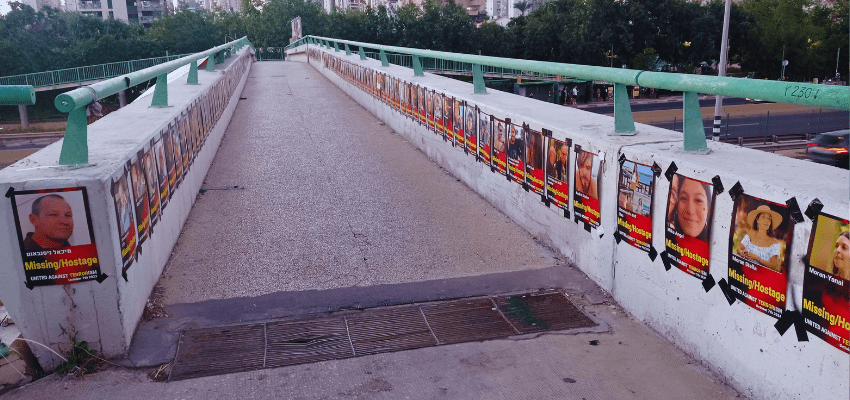By Tzvi Kahn, September 12, 2024
Sobs pierced the air. At the recent funeral of 23-year-old Hersh Goldberg-Polin in Jerusalem, his mother delivered a searing eulogy that captured the national trauma spurred by the murder of six Israeli hostages in Hamas captivity. “OK, sweet boy, go now on your journey,” said Rachel Goldberg-Polin. “I hope it’s as good as the trips you dreamed about, because finally, my sweet, sweet boy, finally, finally, finally, finally you are free.”
Thousands of Israelis who never met the Goldberg-Polin family attended the service. Such solidarity comes naturally for Israelis. In a country where the majority of its citizens serve in the army, Israelis from all walks of life have cultivated bonds of fellowship that embrace every fellow citizen as part of the same extended family. When a terrorist group like Hamas slaughters or kidnaps their countrymen, as it did on October 7, 2023, Israelis take it personally.
Canadians should also take the Hamas threat personally: The group murdered several Canadian citizens on October 7. It would be a mistake to dismiss the events of that day as unimportant just because they took place thousands of kilometres from Canadian shores. Like all Western nations, Canada faces the threat of Islamist terrorism spearheaded by the fundamentalist regime in Iran, which arms and funds Hamas.
The clerical dictatorship in Tehran is also responsible for one of the bloodiest traumas in Canadian history: In 2020, Iran’s Islamic Revolutionary Guard Corps (IRGC) downed Ukrainian International Airlines Flight PS752 minutes after it departed a Tehran airport, killing all 176 people on board, including 85 Canadian citizens and permanent residents. Last June, Ottawa responded by designating the IRGC as a terrorist organization under the Criminal Code.
The designation, which came only after years of public pressure, reflected a brief and belated moral clarity in Ottawa regarding the global threat posed by Iran. In the 11 months since October 7, however, that moral clarity has remained largely dormant. Prime Minister Justin Trudeau has failed to connect the dots between Iran, Israel, and Canada – and consequently misunderstands the Iranian menace.
The federal government doesn’t seem to recognize that Israel constitutes a key front in a larger battle between the Iranian dictatorship and the West, which includes Canada. Tehran regards liberal democracies around the world as a dangerous counterweight to its revolutionary mission to dominate the Middle East in accordance with the values of radical Shiite Islam. Iran fears that Western countries with secular governments committed to freedom of religion and speech aim to corrupt the region with their secular values, thereby making the Islamic Republic’s worldview unpalatable to its neighbours.
However, government leaders in Ottawa have rarely blamed or even mentioned Iran for enabling and encouraging the October 7 massacre. Instead, their policies and rhetoric have effectively treated the war in Gaza as a self-contained, localized conflict untethered to any broader struggle between Iran and the West. This blind spot has led Ottawa to articulate an incoherent Middle East policy that unintentionally benefits both Hamas and Tehran.
Consider Trudeau’s response to Hamas’s slaughter of Hersh Goldberg-Polin and five other Israeli hostages. The murders are “devastating and enraging,” he wrote on X. “Canada stands with the victims’ families in your grief.” He added: “Hamas must release all hostages, lay down its arms, and have no future in the governance of Gaza. Leaders must reach a deal to bring the rest of the hostages home and end the violence.”
Notably, the prime minister makes no mention of Iran. Rather, he effectively treats Hamas, and by extension Tehran, as a political actor that the West can constrain with an agreement that provides its adversaries with concessions. Thus, rather than consistently support Israel’s military campaign in Gaza, Trudeau has called on Jerusalem to exercise “maximum restraint.” In March, Ottawa froze arms exports to Israel. In June, Canada endorsed a ceasefire plan outlined by the United States that would have left Hamas intact, contradicting Israel’s stated war objective of completely destroying the terrorist group.
These policies are music to Hamas and Iran’s ears.
Hamas is no ordinary political party. Rather, it’s a hate-driven antisemitic force, reminiscent of ISIS and al-Qaeda, that harbours genocidal aspirations against the one and only Jewish state. Concessions will not lead such an organization to reform. Rather, to eliminate the threat, Canada and the West need to back Israel’s military campaign. As importantly, they must explicitly blame Iran for fueling Hamas’s aggression.
Such steps would directly advance Canadian interests. The Islamic Republic is unlikely to bring the perpetrators of Flight PS752’s downing to justice so long as it has a de facto green light from the West to wreak havoc against Israel and the West. Likewise, Tehran may not hesitate to attack Canadian citizens directly – whether in Canada, Israel, Iran, or elsewhere – if the regime perceives Ottawa as weak and unprincipled by failing to support the Jewish state in its time of need.
In her eulogy for her son, Rachel Goldberg-Polin said, “I also pray that your death will be a turning point in this horrible situation in which we are all entangled.” Ottawa should take these words to heart. Only a resounding Hamas defeat backed by the West can persuade Iran that its grisly agenda stands no chance of success. All Canadians should regard themselves as personally invested in this outcome.
Tzvi Kahn is a contributing writer with the Macdonald-Laurier Institute, and a research fellow and senior editor at the Foundation for Defense of Democracies. Follow him on X @TzviKahn.






